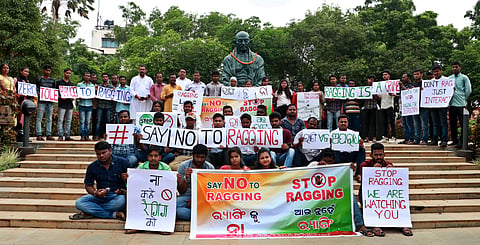

Amidst the reports of brutal ragging cases at several educational institutions across the country, the question comes back to the functioning of anti-ragging committees in these institutions. Experts point out that many such institutions violate the regulations set out by the University Grants Commission (UGC) for the same.
Indian Institute of Technology (IIT), Kharagpur, one of the institutes that was shaken by the death of a third-year student last month, does have a functioning anti-ragging committee, students from the institute informed EdexLive. "The committee, however, was not that active before the incident came to the fore. In the aftermath of the incident, they have been promoting the committee and asking students who have faced any difficulty to consult the committee or the faculty," a student from the institute told EdexLive on the condition of anonymity.
To recall, the parents of the student (who allegedly died by suicide) have claimed that their son "did not die a natural death" and advised parents to be "vigilant" after their wards go off to higher educational institutions. On November 3, the Calcutta High Court directed the police to submit a report on the investigation into the death of the student.
Inactive anti-ragging committees
A similar incident came to light at the Christian Medical College (CMC), Vellore. On November 9, a video was circulated on social media where male students were made to walk in their underwear and water was being sprayed on them from a building, as stated in a report by IANS. Additionally, they were also made to roll in the mud. Officials from the institute told EdexLive that the accusations have been hurled at the anti-ragging committee on campus. "The committee was not very active until this incident. We would only meet at the beginning of the year because there were no issues or incidents. This is the first incident we are dealing with," the official said.
The Supreme Court in May 2009, issued a slew of directions to educational institutions to prevent ragging on campus. Following this, the UGC banned ragging in all forms and set certain rules and regulations for institutions to follow. Among these rules, an anti-ragging committee needs to be set up on campus that is representative of faculty, students and parents. Despite this, according to the response by Union Minister of State for Education, Annapurna Devi, in Lok Sabha on December 20, 2021, 2,790 complaints of ragging had been received from students since 2018, out of which, 1,296 have been punished.
In fact, students from the Institute of Chartered Financial Analysts of India (ICFAI), Hyderabad, informed EdexLive that they have not been made aware of any such committee on campus. "There are posters on campus that say no ragging. But there have been no sessions of awareness programmes of any kind for the same," a third-year law student at the institute said.
How do we achieve a safer campus?
Society Against Violence in Education (SAVE), an NGO that works towards eradicating ragging from educational institutions, told EdexLive that many institutions violate the regulations by not holding regular meetings and have non-functioning helpline numbers. "We have observed a rise in ragging complaints recently. We have filed almost 2,000 RTIs as a large-scale campaign from 2020 to find out if universities across the country are complying with UGC regulations regarding anti-ragging committees and the punishment that perpetrators are meant to get. We found out that many of the anti-ragging committees do not follow the basic requirements and the punishment rules are not followed either. An FIR is supposed to be registered but many of them let the perpetrators escape," said Dr Kushal Banerjee, Co-Founder of the NGO.
Additionally, most of the ragging complaints are from medical colleges rather than engineering colleges, he added. "We are also filing RTIs with the National Medical Commission (NMC) to find out what they are doing about it. Public sensitisation is highly required right now," he added.
Similar views are echoed by author Vibha Batra, who said that ragging is an extreme form of bullying which keeps happening without any checks. "We send children to schools or colleges for studying and shouldn't be worried about their physical safety. The school needs to be a safe environment even for the victim to speak up," Vibha, the author of The Secret Life of Debbie, which explores themes like bullying, gender equality and body positivity, told EdexLive.
Vibha added that measures such as anti-ragging committees and squads, functioning helpline numbers and making children aware of the consequences of ragging need to be ensured. "There are other healthier ways to get to know your freshers. Ragging is abusive and humiliating and should not be accepted as a norm," she said.
